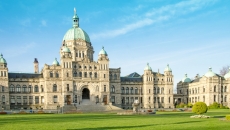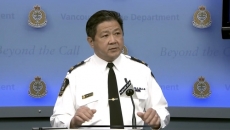New Democrats have joined forces with the governing Liberals to cut short debate over how Parliament should function in the midst of the COVID-19 pandemic.
A government motion to impose closure on the debate passed by a vote of 29-23, with the support of Liberal, NDP and Green MPs in a skeleton House of Commons.
Conservative and Bloc Quebecois MPs voted against closure.
The decision paves the way for a vote later Tuesday on a government motion to waive "normal" Commons sittings in favour of expanding the special COVID-19 committee that has acted as a stand-in for the chamber over the past month.
If the motion passes, the committee will resume sitting Wednesday but in a new hybrid format, with a small number of MPs in the Commons and others participating virtually via two large screens set up on either side of the Speaker's chair.
The motion calls for the committee — which has been meeting twice a week virtually and once a week in person with a small number of MPs in the Commons — to meet four times each week for the next month and four times over the summer.
Conservative and Bloc MPs want the House of Commons to resume its normal operations, albeit with a reduced number of MPs in the chamber.
They argue that the committee structure does not allow MPs to use all the tools they would normally use in the Commons to hold the government to account, including opposition days, introducing motions, posing written questions and debating and voting on legislation on topics other than the novel coronavirus.
However, until the issue of how MPs can vote electronically is resolved, Liberals and New Democrats maintain the special committee is the best way to continue and involve all 338 MPs in the proceedings — not just those who are in the chamber.
Prime Minister Justin Trudeau said earlier Tuesday that there are still limitations in allowing MPs to vote virtually that would prevent some Canadians from having their representatives have an official say on government policies.
"I think it would be important to ensure that Canadians across the country have an ability to make their voices and decisions heard in Parliament through that process. That continues to be something we are working on," he said.
The motion calls on the procedure and House affairs committee to further study how a secure electronic voting system could be set up.
The committee has heard from experts that there may be constitutional and technical concerns over electronic voting, which may also violate traditional principles of parliamentary procedure.






